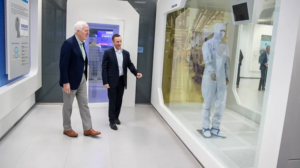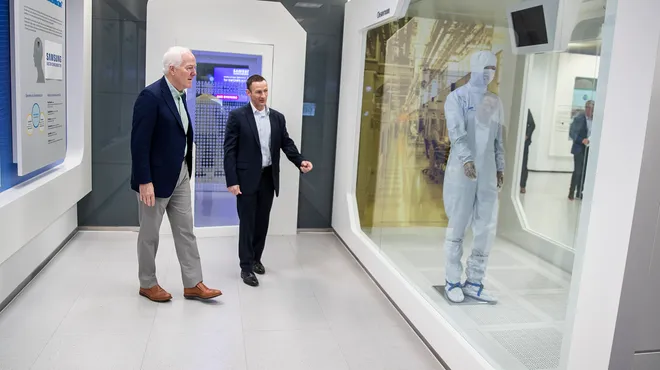 Sen. John Cornyn, right, speaks at a Monday news conference at the Samsung facility in Austin. Joining Cornyn is Jerry Strickland, executive director of the FABSS Texas Coalition, a group of semiconductor manufacturing companies.
Sen. John Cornyn, right, speaks at a Monday news conference at the Samsung facility in Austin. Joining Cornyn is Jerry Strickland, executive director of the FABSS Texas Coalition, a group of semiconductor manufacturing companies.
A global shortage of semiconductors — the computer chips that operate everything from your laptop to your car — is an area of growing concern for Austin’s technology sector, one of the pillars of the region’s economy.
As they gathered Monday for a roundtable discussion in Austin, tech giants and semiconductor manufacturers were looking to Congress in hopes that proposed federal investment in the semiconductor industry will boost the sector and help shore up supply chain issues.
Sen. John Cornyn, R-Texas, is one of the authors the CHIPS for America Act, a bipartisan tech and manufacturing bill designed to expand domestic technology manufacturing. The bill calls for $52 billion to support domestic semiconductor manufacturing, $16 billion to the Department of Energy to research and develop energy-related supply chains, and $81 billion for the National Science Foundation.
Representatives from tech giants Samsung, Dell Technologies, Infineon, NXP Semiconductors, BAE Systems and AMD met with Cornyn at Samsung’s Austin facility to discuss the need for solutions to the supply chain problems.
More:Amid pandemic, Austin’s tech sector has quietly boomed
U.S. Sen. John Cornyn, left, takes a tour with Jon Taylor, Samsung’s vice president of fab engineering, after a news conference at the Samsung Austin semiconductor facility Monday.
“As we learned, we’ve become more and more dependent on technology, represented by the semiconductor industry. I can’t think of any part of our life that hasn’t gotten better or more productive because of the growth of semiconductors. Everything from your cellphone to your car,” Cornyn said.
“We need to think differently about how we encourage manufacturing of this vital component in our daily lives here in America. Not only will that produce good, well-paying jobs, but it will shore up the vulnerable supply chains that we saw exposed during COVID-19.”
The bill passed the U.S. Senate in January and is awaiting a vote in the House. On Monday, Cornyn called on the House to pass the bill, saying it would help the United States keep both the strongest economy and the strongest military in the world.
Cornyn said the pandemic taught a lot of important lessons, including how crucial it is to keep tech manufacturing and supply chains in the United States. He said the country can’t just import products from overseas because it’s cheaper.
“If for some reason your access to semiconductors were cut off, as a result of conflict or something like a pandemic or natural disaster, it would have dramatic, bad consequences on the United States,” Cornyn said. “This is a very, very important issue, but it’s not one that’s foremost in most people’s minds.”
Most semiconductors are manufactured overseas, primarily in Asia, a trend that has increased in recent years. The Semiconductor Industry Association, an advocacy group that represents the vast majority of semiconductor manufacturers in the United States, estimated that the $52 billion federal incentive program would build up the domestic semiconductor industrial infrastructure and would help create 10 new fabs in the United States and add 42,000 semiconductor-related jobs.
Within the United States, Texas manufactures a significant portion of semiconductors, exporting billions of dollars’ worth of chips each year, and could play a key role in the expansion of semiconductor manufacturing.
Jerry Strickland, executive director of the FABSS Texas Coalition, a group of semiconductor manufacturing companies, said the CHIPS Act could boost the state’s manufacturing. Texas makes up about 16% of semiconductor employment in the United States, according to the Semiconductor Industry Association.
“One of the things that is important about Texas is we’d like to be first. Right now we’re not; we’re No. 2 in terms of the number of semiconductor jobs,” Strickland said. “With the CHIPS Act, it’s something that I know a lot of the companies around this table and looking at in terms of Texas being a part of that solution, and being a part of the front on the leading edge of finding those solutions.”
Semiconductors already make up about a quarter of all Central Texas’ manufacturing output, according to the Austin Regional Manufacturers Association. Companies including Samsung and NXP have significant facilities in the Central Texas region. Tech companies including Round Rock-based Dell and AMD also rely heavily on the chips for their own products.
Harry Wolin, senior vice president of AMD, said the company is excited about the opportunities the act could bring. AMD is formally headquartered in California but has most of its operations in Austin and sources chips for its products from semiconductor makers.
“To build state-of-the-art semiconductors, we also need state-of-the-art design and state-of-the-art development,” Wolin said. “What’s important to us is being at front of the line for design. The CHIPS Act doesn’t only recognize manufacturing; it also has portions in for design. I think that will really help the U.S. maintain its leadership in design and regain its leadership in manufacturing.”
Cornyn said companies such as Samsung won’t invest in the United States without a predictable flow of funds or tax credits, something only legislation such as the CHIPS Act can help fuel.
Matthew Bryson, an analyst for Wedbush Securities, told the American-Statesman that subsidies and tax breaks like those the CHIPS Act could bring play a significant role in where semiconductor companies decide to put fabrication facilities.
“When I look at Austin, its strengths are its human capital, infrastructure and stability (the recent storms notwithstanding). The reason, in my view, that companies have avoided building fabs in the U.S. is predominantly incentives to build elsewhere. The CHIPS Act would seemingly place the U.S. on more equal ground with other geographies, assuming the U.S. ramps up its support for fab development,” he said.
Samsung could invest in Central Texas
The CHIPS legislation is being debated as Samsung is considering locations for a proposed $17 billion state-of-the-art chip plant. In early February, the company confirmed that the Central Texas region is one of several locations being considered. Other locations include New York and Arizona.
Jon Taylor, vice president of engineering and corporate public affairs for Samsung, said the technology and chips currently produced in Austin serve customers in the United States and globally on a range of products that make lives better and safer.
“The chip shortage is affecting our customers, and we’ve worked hard to boost production to meet the surge of demand,” Taylor said. “We optimized our capacity, and the only way for us to meet demand going forward is through expansion.”
Taylor said the CHIPS Act was a key element in the company’s decision to expand in the United States.
“It’s a massive cost difference between building and operating a (fabrication plant) in the U.S. and doing the same thing overseas,” Taylor said. “That’s why the CHIPS Act is so important to us, to bridge that gap.”
Samsung spokeswoman Michele Glaze said Monday that no decisions have been made in regard to the location of the facility. The company has had significant operations in Austin since 1997, including a fabrication plant where about 10,000 people work — about 3,000 Samsung employees and 7,000 contractors. It also has a research and development facility project in Austin.
Bryson said the overall semiconductor shortage has gotten more severe in the past few months, as demand for products including enterprise hardware and cloud has picked up and the supply chain has been stressed further by problems outside of the pandemic, with a fire in a Japanese facility and shutdowns in Texas.
Semiconductor fabs typically are operational 24 hours a day for years on end. Each batch of wafers — a thin slice of semiconductor used for the fabrication of integrated circuits — can take 45 to 60 days to make, so a shutdown of any length can mean a loss of weeks of work. Restoring a fab is also a complicated process and even in the best of circumstances can take a week.
In Central Texas, Samsung and NXP fabs were both powered down in February during the freeze, leading to product losses, which added to existing supply chain challenges.
Samsung, which was offline for more than a month, saw wafer loss equivalent to $268 million to $357 million, and NXP estimated the shutdown resulted in a $100 million loss in revenue and a month of wafer production.
It remains to be seen whether the shutdown could affect Central Texas’ chances of gaining semiconductor expansion, including the Samsung facility.
Source: https://www.statesman.com/story/business/2021/06/28/austin-tech-giants-press-congress-boost-chip-industry/7785364002/

